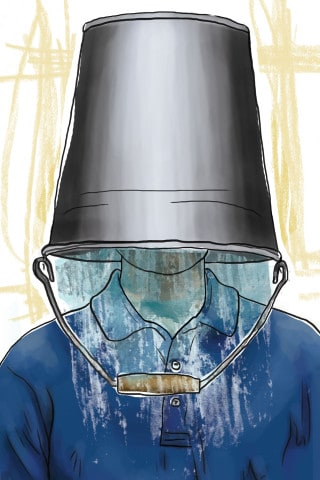ZACH TENNENT
The ALS Ice Bucket Challenge has been pretty hard to ignore in the last few weeks. In essence, the challenge involves recording yourself being soaked with ice water and then subsequently challenging others to either do the same or to opt out and donate $100 to Amyotrophic Lateral Sclerosis (ALS) research.
 It has proven to be a marvelous piece of viral fundraising, with nearly $80 million being raised between July 29 and Aug. 25. Comparing that figure to the $2.5 million raised in the same time period last year shows the impressive upswing that the challenge has brought for the ALS Association. But this raises a question: is it foolish or genius to blend charity and social media fads?
It has proven to be a marvelous piece of viral fundraising, with nearly $80 million being raised between July 29 and Aug. 25. Comparing that figure to the $2.5 million raised in the same time period last year shows the impressive upswing that the challenge has brought for the ALS Association. But this raises a question: is it foolish or genius to blend charity and social media fads?
It makes perfect sense; who doesn’t want to see videos of their friends — or better yet their enemies — soaked in freezing cold water on Facebook? Even celebrities have embraced the challenge, with everyone from Jimmy Fallon and Gene Simmons to Dr. Dre and Bill Gates getting drenched for the cause.
But along with raising money, the challenge is also raising lots of criticism and opposition — and a lot of it is extremely valid. I would agree with the accusation that as the trend continues to grow in popularity, less of the focus is placed on the association with ALS and more on those being doused with ice water.
Some of the blame for this should also be put on the ALSA. The idea of ice bucket challenges predates the ALSA and as far as I can tell, there’s no real connection to be made between getting soaked in cold water and living with ALS.
The idea of combining the two seems to have come from Pete Frates, a college baseball player whose career was cut short by ALS. The ALSA subsequently backed and supported the challenge enthusiastically. While it’s a shame that the point is being forgotten, it shouldn’t really come as a surprise. The two were just sort of tacked together without any real initial ties.
This is not a particularly reassuring perspective to take on the matter, but one has to wonder if peer pressure is the best way — or even the only way — to get people to be charitable. Full disclosure: I was nominated and took part in the challenge along with making a donation of less than $100. Not to say that I never would have considered donating to ALS before, but the nomination was certainly the impetus to do it this time around.
ALSA does deserve credit for their ingenuity in this department, however. They recognized that piggybacking on what was sure to become a huge fad regardless would be a surefire plan for exposure, awareness and success — and they were right. Perhaps the idea took some inspiration from the wildfire craze of the Neknomination challenges — where participants drank copious amounts of alcohol and then nominated friends to do the same, while one-upping each other as the challenges progress.
Obviously getting soaked with water is a little more innocuous than that, but the general spirit is the same: do it because your friends are. It is very likely that without the association between the ice bucket challenge and ALS, the campaign would have not been as successful.
But despite all the money raised for ALS research, the purpose behind the Ice Bucket Challenge is being overshadowed by what people really want. There’s no real entertainment to be found in knowing that someone you do or do not know made a donation to charity, but there certainly is in seeing them drenched with water.
Furthermore, the core principle of the challenge must have been that most people would find donating money to be a more favorable choice and opt to do that over being dumped with water when challenged. This does not seem to be the case, however. By now, the fad seems to have outgrown its true purpose and the Ice Bucket Challenge is tremendously popular with those who don’t even know its connection to ALS.
So what have we learned from the ALS Ice Bucket Challenge? It seems that the moral of this story is not particularly encouraging. We can see that peer pressure can sometimes be the most effective motivating force when it comes to charity. We can also see that another effective way of raising funds and awareness about a disease can be to more or less put it in the background and obscure it from public view.
With few exceptions, almost none of the videos I’ve seen have actually addressed the circumstances or effects of having ALS and had I no idea what it was previously, the huge publicity of the Ice Bucket Challenge has done next to nothing to enlighten me. Despite that, the ALSA has clearly made out very well from this, so perhaps it doesn’t matter for most people to know what they’re giving to, as long as they understand it to be a good cause.
Maybe this is just an example of what will soon become common in the world of donation raising. Even if the Ice Bucket Challenge is utilizing the same basic model behind Neknominations, if it’s using it for a good cause, why should I be knocking it?
—
Graphic: Stephanie Mah/Graphic Editor
Leave a Reply